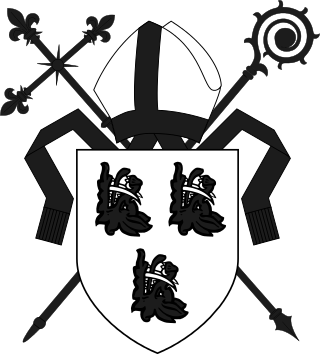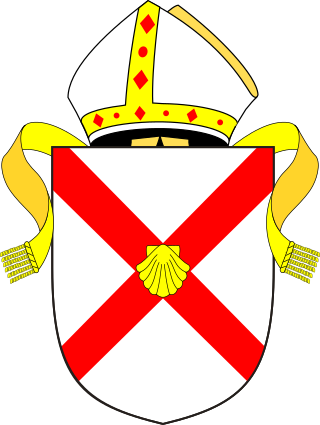
Roger Northburgh was a cleric, administrator and politician who was Bishop of Coventry and Lichfield from 1321 until his death. His was a stormy career as he was inevitably involved in many of the conflicts of his time: military, dynastic and ecclesiastical.

Lawrence Booth served as bishop of Durham and lord chancellor of England, before being appointed archbishop of York.

The Bishop of Worcester is the head of the Church of England Diocese of Worcester in the Province of Canterbury, England. The title can be traced back to the foundation of the diocese in the year 680. From then until the 16th century, the bishops were in full communion with the Roman Catholic Church. During the Reformation, the church in England broke away from the authority of the Pope and the Roman Catholic Church, at first temporarily and later more permanently. Since the Reformation, the Bishop and Diocese of Worcester has been part of the Church of England and the Anglican Communion.

The Bishop of Rochester is the ordinary of the Church of England's Diocese of Rochester in the Province of Canterbury.
John Watson (1520–1584) was an English Anglican bishop who served as Bishop of Winchester in the 1580s.
The Archdeacon of Oxford is a senior ecclesiastical officer in the Diocese of Oxford, England. The office responsibility includes the care of clergy and church buildings within the area of the Archdeaconry of Oxford.

Sir Richard Kaye, 6th Baronet,, LL.D was an English peer, churchman and scientist. He was Dean of Lincoln from 1783, and inherited the baronetcy from his elder brother Sir John Lister Kaye, 5th Baronet in 1789.
The Archdeacon of Leicester is a senior ecclesiastical officer in the Church of England Diocese of Leicester.
Robert de Stretton was Bishop of Coventry and Lichfield following the death of Roger Northburgh in 1358. A client of Edward, the Black Prince, he became a "notorious figure" because it was alleged that he was illiterate, although this is now largely discounted as unlikely, as he was a relatively efficient administrator.
Henry Bridgeman was an Anglican clergyman who served in the Church of England as the Bishop of Sodor and Man from 1671 to 1682.
Charles Booth, D.C.L. was a sixteenth-century clergyman who served as the Bishop of Hereford from 1516 to 1535.
James Denton was an English cleric. He was a Canon of Windsor from 1509 to 1533, Archdeacon of Cleveland from 1523 to 1533, and Dean of Lichfield from 1523 to 1532.
Anthony Hawles DD was a Canon of Windsor from 1660 to 1664 and Archdeacon of Salisbury.
John Hills, D.D. was a priest and academic in the late 16th and early 17th centuries.
Christopher Massingberd was an English Anglican priest in the 16th-century.
William Hutchinson was an English priest in the late 16th and early 17th centuries.

Byrom Eaton D.D. (1613–1703) was an English priest.
The Venerable Edmund Diggle, D.D. was a priest in England during the 17th century.
John Walton was an Anglican priest, who served as Archdeacon of Derby from 1603 until 1603.
The Venerable John Wardroper, DCL was an English clergyman.
This page is based on this
Wikipedia article Text is available under the
CC BY-SA 4.0 license; additional terms may apply.
Images, videos and audio are available under their respective licenses.






